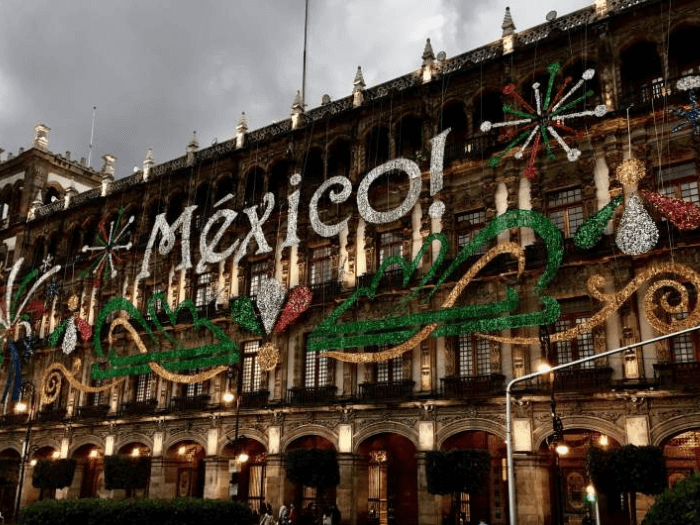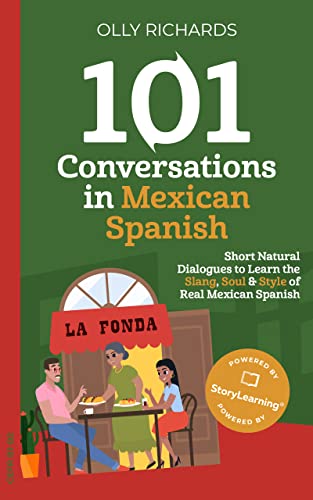
Mexico. The most populous Spanish-speaking country in the world and one of the most influential in terms of Spanish language film and literature.
If you're going to learn the common Spanish expressions of any country, Mexico is a great one to start with.
Secondly, there are some unique Mexican expressions that were probably not included in your Spanish textbook or course.
You’ll encounter Mexican insults, slang, and idioms frequently in movies, tv, and pop culture, as well as in your conversations with Mexicans you meet!
In this post, I’m going to help by sharing 29 of the most common Mexican Spanish slang words and expressions you’re likely to hear.
But first… let’s talk about why learning Mexican slang terms, phrases, and idioms are important if you want to become a confident Spanish speaker.
Table of Contents
By the way, if you want to learn to speak like a Mexican and participate effortlessly in local conversation, why not check out my popular Mexican Spanish book?

101 Conversations in Mexican Spanish
Real Mexicans don’t speak like your textbook… so it’s no wonder you struggle with the slang and expressions of spoken Mexican Spanish! This book fixes that. For the first time, you’ll learn to move beyond beginner level, and speak Spanish in the real world! With 101 authentic conversations in intermediate Mexican Spanish, and a brand-new story in this edition, you’ll become confident in the words, phrases and expressions you need to communicate like a local.
(Available in Paperback and on Kindle)
If you prefer a comprehensive course that will teach you all aspects of Spanish in detail my top recommendation is Spanish Uncovered, which teaches you through StoryLearning®. Click here to find out more and try out the method for free.
Why Learn Mexican Slang Phrases & Idioms?

Spanish idioms and slang are two of the things that complicate the process of transitioning from staged speaking and listening exercises to chatting comfortably with a native Spanish speaker.
If you stop to think about it, you can probably come up with a whole list of words in your native language that mean something other than the literal translation or have different meanings around the world.
For example, with English words:
- An “apartment” in the United States is a “flat” in the UK or Australia.
- A “car park” in Britain would be a “parking lot” in the US and Canada.
- A “barbie” in Australia means a barbeque, whereas, in other English speaking countries, you'd probably think of a Barbie doll!
So it’s always a good idea to learn slang and common expressions when you are planning to travel to a new place.
Learning Mexican slang will help you understand what is being said and help you sound more like a native speaker yourself.
It will help you fit in so you sound less like a foreigner.
Imagine the surprise on your new friends’ faces when you use common Mexican slang words with ease!
So as you can see – learning some Spanish slang is pretty useful! For talking to people and if you want to watch and understand any famous Mexican film.
Now because a lot of dictionaries, movie translations, and study guides come out of Spain, many Spanish learners pick up on Peninsular Spanish expressions when learning Spanish slang before they learn Latin American slang.
That can lead to confusion when you travel to Latin America and keep you from learning colloquial expressions and terms.
So instead of focusing on slang from Spain, in this post, we’ll look at essential slang from one of Latin America’s biggest and most influential countries: Mexico.
Key Features Of Mexican Spanish: Vocabulary & Grammar

Before I get to the list of Mexican slang phases, there are two key things you should know about Spanish in Mexico as opposed to Spain or other Spanish-speaking countries:
- Mexicans do not use the vosotros or vos conjugations for informal speech. The ustedes form is the only conjugation you’ll need for groups (whether you’re friends or not) and tú is used for all informal second-person situations.
- Mexico has more words based on English than other Spanish-speaking countries, probably because of its proximity to the United States. For example, here are some Mexican words you may not hear anywhere else:
- hobby (hobby)
- marqueta (market)
Ok, we’re ready to get started!
Without further ado… here are 29 Mexican slang words and phrases that will have you sounding like a native in no time!
If you prefer to learn by watching videos, check out the video lesson from the StoryLearning® Spanish YouTube channel below. That way you can hear how these words are pronounced.
Or for the full list of 29 Mexican slang words and phrases, scroll down and keep reading!
29 Mexican Slang Words And Phrases Every Spanish Learner Needs To Know
1. ¿Mande?
This slang word is used to ask someone to repeat something if you didn’t hear or understand what was said the first time.
This is extremely helpful to know if you are travelling to Mexico as a Spanish learner, as you may often need people to repeat themselves.
It is considered more polite than ¿Qué? or ¿Cómo? in Mexico, but rarely used elsewhere.
2. Pedo
Technically, pedo translates to “fart,” but it is used in quite a few phrases in Mexico, some of the most common of which are:
- ¿Qué pedo? – What’s up?
- No hay pedo – It’s no problem
- Andar bien pedo/a – to be very drunk
- ¿Dónde es la peda? – Where is the party?
Pedo is considered quite crude in some parts of the Spanish-speaking world, so I suggest you pay attention to what the people you are speaking with are saying before trying these phrases yourself, especially if not all of your speaking companions are from Mexico.
3. ¿Qué onda?
This one is nice and simple! It’s another casual way to ask a close friend, “What’s up?” and you’ll hear Mexicans use it all the time.
4. Güey (also spelled “wey”)
Güey translates roughly to “dude” or “man” in Mexico.
In Spain, this Spanish word may be used to ask a friend, ¿Qué pasa, tío?, you’d be much more likely to say, ¿Qué onda, güey? – “hey dude, what's up” in Mexico.
5. Codo/a
Codo/a literally translates to “elbow,” but it is also used in Mexico to describe someone overly frugal or tightfisted with his or her money.
- Juan nunca gasta en cosas innecesarias. Es muy codo. – Juan never spends money on unnecessary things. He’s very frugal.
6. Estar crudo/a

Put simply, estar crudo/a means to have a hangover.
Literally, it would be translated as “to be raw”, which is probably not a bad metaphor for feeling hungover!
- Estoy bien crudo hoy. – I’m very hungover today.
7. ¿Qué tal?
I bet you’re surprised to see this phrase make the list.
After all, ¿Qué tal? is not specific to Mexico. You will hear Spanish speakers around the world using it.
However, it does have a different meaning in Mexico than in Spain and some other Spanish-speaking countries.
In Mexico, ¿Qué tal? means “What’s happening?” or “What’s up?” as opposed to “How are you?” or “How are things going?” as you may have learned in your Spanish textbook or class.
So, it’s much more casual than the same phrase would be in other dialects of Spanish.
8. Tener feria
This one means “to have money”, as in:
- ¿Tienes feria para salir este fin de semana? – Do you have money to go out this weekend?
In some parts of Mexico, feria can also refer to pocket change.
9. ¡No manches!
You will use this expression most often when listening to a story or anecdote as it’s used to express shock or surprise.
In English, it would translate roughly to “No way!” or “You’re kidding me!”
10. La neta
La neta in Mexican Spanish means the truth.
It can be used either as a way to agree with someone;
- Sí, es la neta – Yes it’s the truth
… or to express doubt in what they’re saying:
- ¿Es la neta? – Is it the truth?
If you refer to a person as neto/a, you are describing someone who can be trusted or that you can always count on – eres la neta!
11. Ni modo
There is no literal translation of ni modo in English, but it falls somewhere between “no big deal” and “it is what it is.”
You can use ni modo to say you have no preference or also to express disappointment at something you have no control over.

12. ¡Aguas!
¡Aguas! means… Watch out!
The story goes that this expression dates back to the days when the contents of chamber pots and other wastewater were tossed out the window and into the street each morning.
These days, ¡Aguas! isn’t related to water or waste at all. Instead, it’s an expression similar to “Heads up!” still used in Mexico and some parts of the United States.
13. Estar cañón
This literally means to be difficult or hard, as in:
- El examen estuvo cañón – The exam was really hard.
You can also use cañón to add intensity to an expression, such as:
- Te extraño cañón – I miss you so much.

14. Eso que ni qué
This handy Mexican phrase means “definitely” or “without a doubt”.
Use eso que ni qué to express total agreement with what someone else is saying.
- – Chichen Itza es uno de los lugares más conocidos de México – Chichen Itza is one of the most well-known places in Mexico.
- – Eso que ni qué – Without a doubt!
15. Fresa
You probably already know that the noun fresa literally means “strawberry”.
In Mexico, though, native speakers use it as an adjective to describe someone as stuck up or snooty.
16. Vato
Vato means “guy” or “man”, and has a measure of respect or being impressed about it.
However, in some situations, it also has a gang connotation and can be the Mexican slang for gangster.
There’s some debate about whether vato is a variant of bato (fool), chivato (informant or snitch), or other indigenous words from the region.
Wherever it comes from, it is used today in Northern Mexico between friends.
It’s also been included in a number of Spanglish expressions and songs, such as in the Texas Tornados song, “Hey Baby, ¿Qué Paso?”:
17. Chido/a
Chido/a is used as an adjective meaning “awesome” or “cool”.
The Mexican version is used the same way you would use guay in Spain. For example:
- Es un vato chido – He’s a cool guy!
18. Padre
Of course, padre generally means ‘father’ in Spanish, but in Mexico, it’s also another way to say, “Awesome!” or “Great!”, for example:
- ¡Qué padre! – How awesome/great!
19. Chicano/a
This term is an interesting one and you may well hear it used among latinos in the US as well as in Mexico.
It’s a Mexican slang word that refers to people of Mexican origin living in the United States.
20. ¡Órale!
There’s no literal translation for the slang word órale in English.
Instead, it can mean one of a few different expressions, such as:
- “Okay”
- “Well done”
- “Come on”
- “No way!”
I know it sounds tricky but don’t worry! The context will always make it pretty clear what is being expressed.
21. Ser bien gacho/a
To be gacho can be used to describe people as “lame” or “uncool”.
When directed at a situation, it is another way to say mala onda or “bad vibes” which is the opposite to buena onda, “good vibes”!
- No me gusta esta fiesta. Está bien gacha. – I don’t like this party. It has bad vibes.
22. Carnal
Carnal can be used to describe “brother”, either literally or as an expression or term of endearment between close friends.
- Oye, carnal, ¿cómo te va? – Hey brother, what’s up?

23. Te crees muy muy
This one is the slang term for “You think you are such a big deal” and is used in the same way its translation would be in English.
It may seem simple, but it is commonly used and can go a long way to helping you sound more natural in your conversations with Spanish speakers in Mexico!
24. Chavo/a
A word used to informally refer to children, like “kids” in English.
Other words in Mexico with similar meanings include chamaco/a and morro/a.
- Los chavos están jugando al fútbol – The kids are playing football.
25. Sin broncas
The Mexican slang word Bronca roughly translates to “fight” or “row.”
So, to say something or someone is sin broncas, you are saying there’s no problem (e.g. they’re “without fight/disagreement”).
26. ¡Qué huevos!
This phrase is used to express admiration or amazement at something daring or brave.
It's also sometimes used to express dismay or disgust. And when it is, you’ll be able to tell easily from the context.
¡A huevo! is a similar expression that means “Absolutely!” or “Let’s do it!”
However, it’s a really good idea to use the word huevos with care, as it’s also a common Spanish slang term for “testicles”!
As you might imagine, it basically means there are many vulgar innuendos and Mexican slang insults that include the word huevos, so much so that some foreigners fear even using the word when ordering eggs at a restaurant!
You don’t need to worry about saying Mexican curse words when ordering huevos directly. But do be careful to avoid any unfortunate hand signs or overly specific descriptions that could lead to a round of laughter at your expense!
27. Huevón/a
Huevón literally means a “large egg” but is used as a slangy Mexican interjection or an insult to talk about an extremely lazy person. For example:
- Mario nunca hace nada. ¡Qué huevón! – Mario never does anything. What a lazy guy!

28. Sale
Just as Spaniards say vale to mean “Let’s go!” or “Okay, cool,” and Argentineans use dale, Mexicans express the same thing with the word sale.
- ¿Vamos al cine a la tarde? – Sale – Shall we go to the cinema in the afternoon? Ok, cool.
29. No hay de queso, nomás de papas
This classic Mexican slang phrase is used in place of “you’re welcome,” and it’s actually a play on words made famous by a popular Mexican television show!
It is a variant of the common expression no hay de qué, which means “no problem.”
Mexican Slang FAQs
How Is Mexican Slang Different From Other Spanish Dialects?
Mexican slang, known as “mexicanismos”, is distinct from other Spanish dialects. It incorporates many Nahuatl-derived words and unique expressions, such as “¿Qué onda?” (What's up?) and “chido” (cool). Mexican slang often uses double meanings and wordplay, making it particularly colourful and expressive. While some Mexican slang terms have spread to other Spanish-speaking countries, many remain specific to Mexico, reflecting its unique cultural identity and linguistic evolution.
What Are Some Common Mexican Slang Words?
Common Mexican slang words include “güey” (dude), “chamba” (job), and “padre” (cool). “Neta” means truth or really, while “órale” is used as an encouragement or agreement. “Morro/a” refers to a young person, and “chido” means awesome or great. These words are widely used in casual conversations across Mexico and reflect the country's vibrant linguistic culture. It's important to note that slang usage can vary by region and social context within Mexico.
Is Mexican Slang Hard To Learn?
Mexican slang can be challenging but not impossible to learn. The main difficulty lies in understanding context and cultural nuances, as many slang terms have multiple meanings or rely on wordplay. However, with consistent exposure to Mexican media, conversations with native speakers, and dedicated study, learners can gradually pick up common slang terms. It's worth noting that mastering slang enhances your ability to communicate naturally and understand contemporary Mexican culture.
It’s Time To Start Using Your Mexican Slang!

There you have it!
29 Mexican slang words and expressions to impress your friends while travelling in Central America and sound fluent in Spanish in no time!
By learning these common Mexican phrases, when studying Spanish, you’ll not only learn to keep up in conversation with your Mexican friends but also be able to watch a range of fantastic Mexican movies and TV shows that use colloquial slang.
You’ll be able to speak the Mexican lingo with greater confidence without the fear of being laughed at for using “textbook phrases” or formal Spanish.
So what are you waiting for? Learn the phrases that are most relevant to you, then get out there and practice using them! ¡Suerte!
By the way, if you want to learn any variety of Spanish fast (including Mexican Spanish) and have fun while doing it, my top recommendation is Spanish Uncovered which teaches you through StoryLearning®.
With Spanish Uncovered you’ll use my unique StoryLearning® method to learn Spanish naturally through story… not rules. It’s as fun as it is effective.
If you’re ready to get started, click here for a 7-day FREE trial.

Olly Richards
Creator of the StoryLearning® Method
Olly Richards is a renowned polyglot and language learning expert with over 15 years of experience teaching millions through his innovative StoryLearning® method. He is the creator of StoryLearning, one of the world's largest language learning blogs with 500,000+ monthly readers.
Olly has authored 30+ language learning books and courses, including the bestselling "Short Stories" series published by Teach Yourself.
When not developing new teaching methods, Richards practices what he preaches—he speaks 8 languages fluently and continues learning new ones through his own methodology.









































